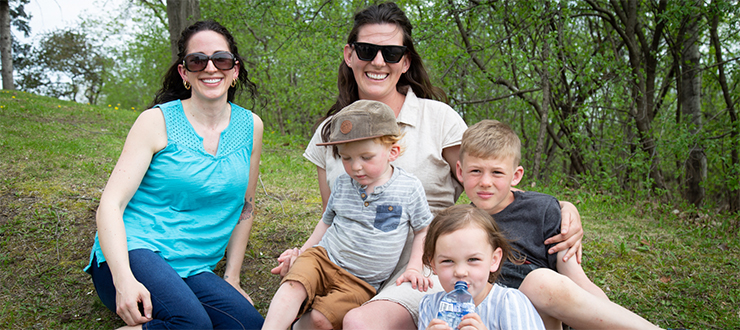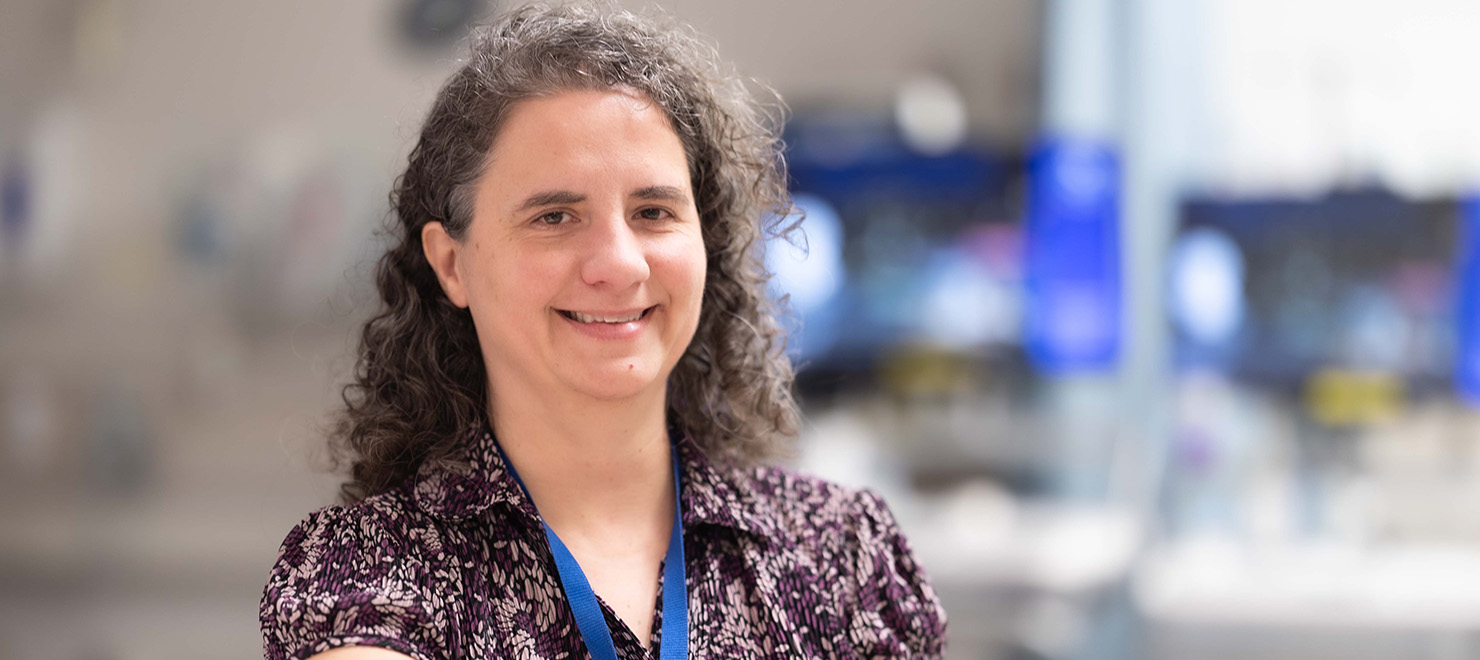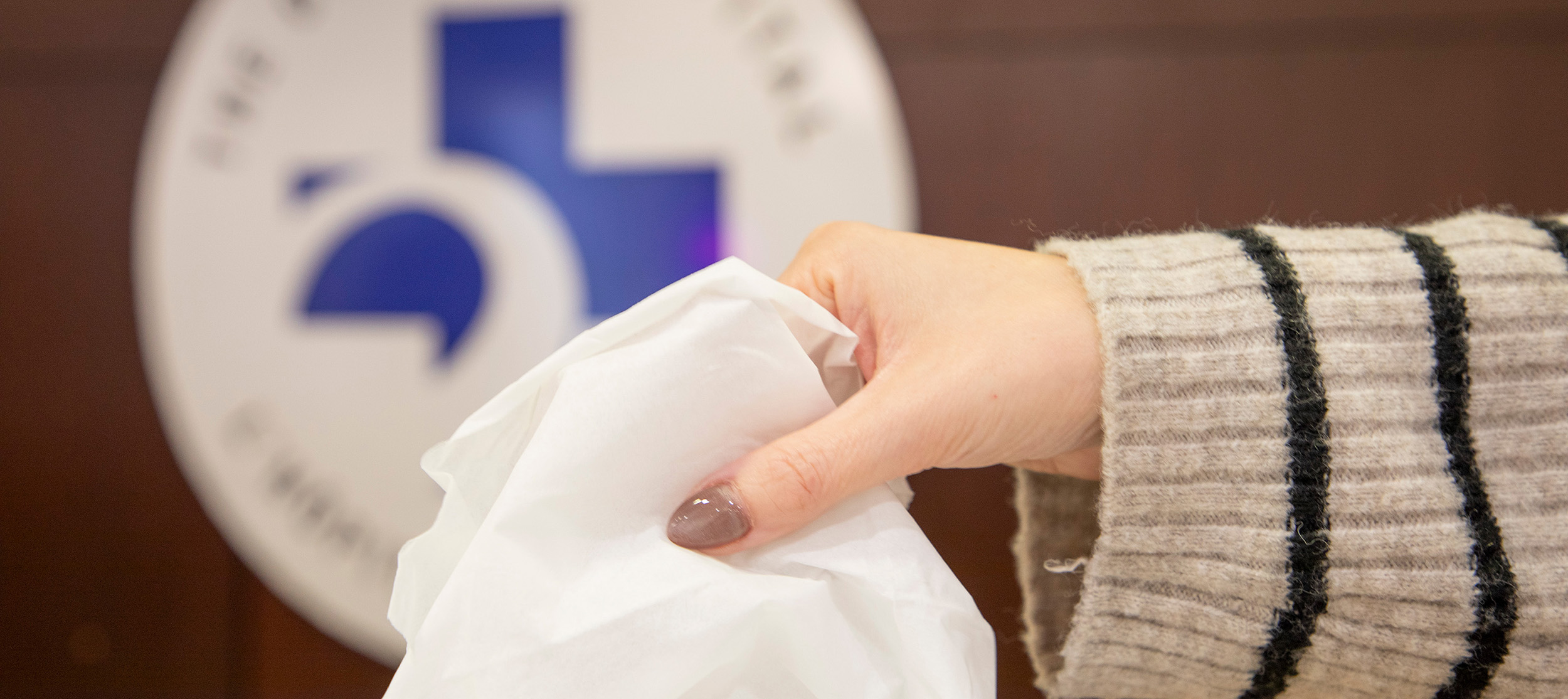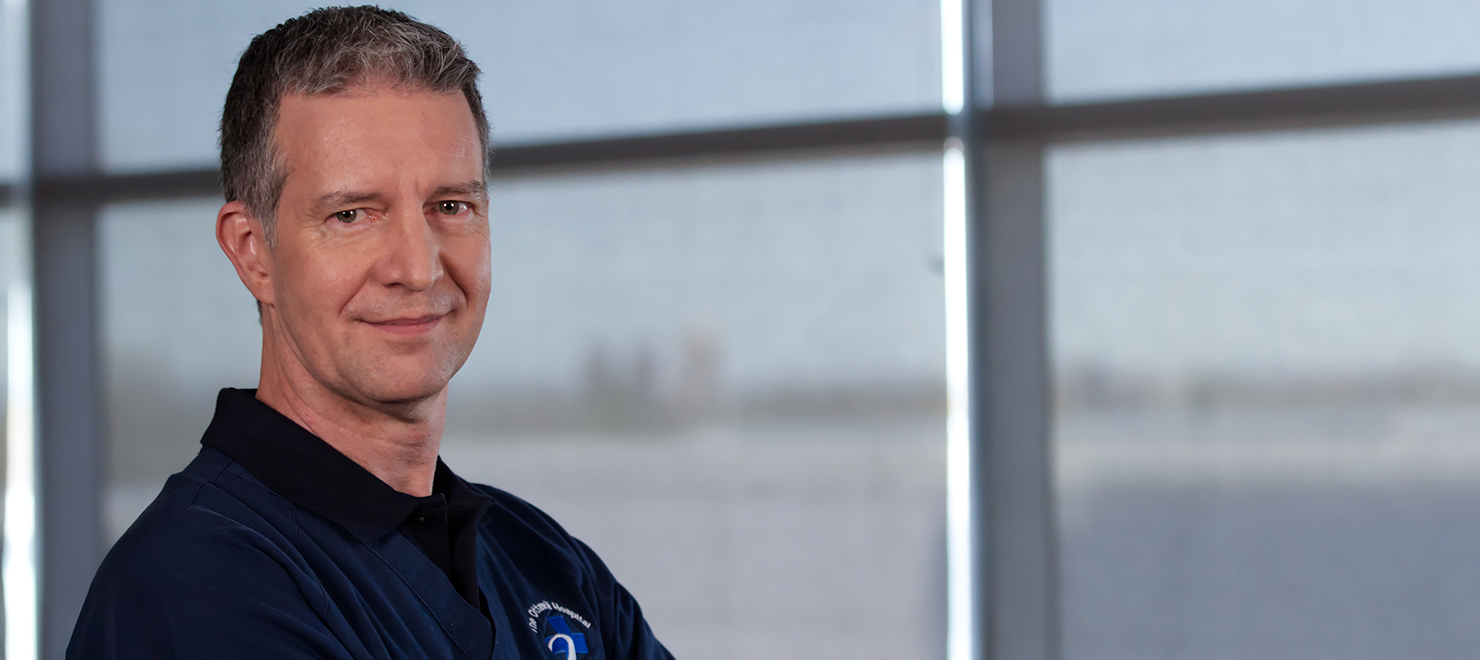
Sophie Barrette (left), registered nurse at The Ottawa Hospital, reunites with Katie Cleary and her two-year-old son, Van, after Sophie saved the boy from choking by performing CPR. The happy trio are joined by two of Van’s siblings, Willa and Bentley.
Last month, Katie Cleary was shopping at Costco with her two-year-old son, Van, and her infant son, Theodore. They were trying the free samples, as they usually do, when Katie noticed that Van looked like he was having “brain freeze” after eating a frozen strawberry. She soon realized that his shocked expression was not from the cold.
The strawberry was lodged in his throat, and he could not breathe.
The colour in his face quickly began to change. Panicked, she pulled him from the cart and started performing the Heimlich maneuver (abdominal thrusts). But he soon became unconscious in her arms.
Shoppers and employees came running to assist. Another bystander performed the Heimlich, with no success.
“Watching my baby limp and blue, I started screaming for someone to help,” Katie recalls.
An employee yelled for any nurses or doctors to immediately provide first aid.
Sophie Barrette is a registered nurse with The Ottawa Hospital who happened to be at Costco that day. When Sophie heard the pleas for help, she left her six-year-old daughter with a bystander and raced to the scene.
When Sophie arrived, two men had Van upside down, hitting his back. The men would later tell Sophie that they had both been trained in CPR (cardiopulmonary resuscitation), but their certifications were not up to date.
Sophie took Van into her arms. She put the boy over her knee and performed back blows, but to no effect. She then flipped him over and performed chest compressions for about a minute and a half. “I noticed a bit of colour coming back,” Sophie recalls, “and a faint pulse that I didn’t think would last.” She performed chest compressions again for 30 seconds, and more colour returned to Van’s face. Because the strawberry had not been dislodged, she turned him onto his side to keep his airway as open as possible. “I rubbed his back, and after five minutes, he started to open his eyes.” His mother embraced him.
“I had witnessed a miracle,” says Katie, “and I know those around us felt the same.”
When paramedics arrived, Katie describes how Sophie calmly recounted the details, never wavering in her composure despite the intensity of the situation.
“I know without a doubt that if Sophie was not at Costco that day, our family’s life and happiness would be changed forever,” says Katie.
Van stayed overnight at CHEO and was released the next day in perfect health. But Katie is already preparing for future emergencies. “I have already booked my family and myself to attend a CPR course. I have bought choking devices to have in my diaper bag and at a friend’s house,” she says. “My thought is if I can help anyone else the way Sophie has helped me, it’s another way that I can honour her and what she did.”
Prepare for a health emergency with these helpful resources
The Ottawa Hospital’s trauma services team has compiled the following list of training programs and resources to help prepare you for a variety of emergency situations.
Cardiopulmonary resuscitation (CPR)
Cardiopulmonary resuscitation (CPR) is a lifesaving technique that’s useful in events such as a heart attack or near drowning, in which someone’s breathing or heartbeat has stopped. Most CPR courses include how to assist an individual who is choking, whether they be a child or an adult.
- Ottawa Paramedic Service–CPR C & AED course: This half-day course teaches participants how to recognize and respond to cardiovascular emergencies. Students will learn to administer CPR to adults, children and infants as well as choking procedures and the use of an AED (automated external defibrillator).
- Heart and Stroke Foundation–Heartsaver CPR AED course: The Heartsaver course is designed for people who don’t have medical training but want to be prepared to help in case of a cardiac arrest or choking emergency. This course is ideal for caregivers, parents and families with children or infants.
First aid
First aid’s primary objective is to preserve life. First aid training focuses on providing immediate care to sick or injured patients until full medical help is available. First aid training imparts confidence to the public to step up and take action when an emergency occurs. Responding promptly with effective first aid can save a life or prevent a person from suffering permanent disability. Some first aid courses include CPR training as part of the curriculum.
- Canadian Red Cross–First Aid Basics Workshop: This introductory workshop in basic first aid skills is suitable for any audience.
- St. John Ambulance–Emergency First Aid CPR-C & AED (CSA Basic): This one-day course meets the Canadian Standards Association (CSA) standards for basic first aid.
- Heart and Stroke Foundation–Standard First Aid: This comprehensive two-day program is designed for those who want to learn essential skills to effectively respond to emergencies at home or at work.
Drowning prevention
Drowning prevention education is vital to promoting water safety. To help prevent drowning from an unexpected fall into water, all parents and children should learn survival swimming skills. Participating in formal swimming lessons can also reduce the risk of drowning among children and adults.
- Canadian Red Cross: This website offers a number of swimming and water safety resources, as well as educational offerings.
- The Lifesaving Society: This charitable organization works to prevent drowning and water-related injury through public education, training programs and more.

Support patient care and research at
The Ottawa Hospital
You might also like…
Living with chronic pain? This online tool offers help — and hope
The Power Over Pain Portal is a free virtual resource hub designed to help empower youth and adults living with chronic pain through education and peer support.
What to do in an emergency: New first aid video series on YouTube
Would you know what to do if you saw someone experience a stroke, heart attack or opioid overdose? We’ve launched a series of easy-to-follow videos on YouTube that walk you through how to respond to common first aid emergencies.
Flu season 101: A quick guide to keeping the sniffles away
Got two minutes? This short guide could help you make it through flu season without stocking up on tissues.
Aging well: Guidance for older adults
In this special video series for both older adults and their loved ones, geriatric care specialists from The Ottawa Hospital offer guidance on navigating common health-care challenges that may arise with aging.
How to stay safe around water this summer
Drowning can happen to anyone — even strong swimmers. Emergency physician Dr. Christian Vaillancourt debunks common myths about drowning, explains how to act quickly to save a life, and shares what you can do to keep yourself and your loved ones safe around water.
What’s the difference between an optician, optometrist, orthoptist and ophthalmologist?
“Do I need to see an optician, optometrist, orthoptist or ophthalmologist?” We asked Ophthalmologist Dr. Annick Fournier to break down each role so you will know who to consult for your specific eye care needs.


 To reset, hold the Ctrl key, then press 0.
To reset, hold the Ctrl key, then press 0.





